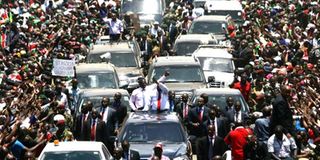This country doesn’t have the moral authority to challenge Western states

President Uhuru Kenyatta waves to his supporters at Muthurwa Market in downtown Nairobi on October 9, 2014. FILE PHOTO |
What you need to know:
- Unfortunately, our sycophantic and myopic politicians and so-called intellectuals are not even capable of making a coherent anti-imperialist argument against the ICC as they have neither the moral authority nor the tools with which to make such an argument.
- Kenya’s over-paid politicians zoom into Parliament in their German or Japanese luxury cars. Kenyans are among the biggest consumers of products manufactured in Europe or America.
- They are not in a position to force the ICC, to which they are signatories, to try war criminals who have committed, and who continue to commit, atrocities in the Middle East, for instance.
If Kenya’s political class was not so intellectually challenged, and if the Kenyan economy was not so dependent on Western aid and capital, President Uhuru Kenyatta’s case at the International Criminal Court could have provided an opportunity for Kenya to expose the hypocrisies of Western nations and to assert its sovereignty.
Unfortunately, our sycophantic and myopic politicians and so-called intellectuals are not even capable of making a coherent anti-imperialist argument against the ICC as they have neither the moral authority nor the tools with which to make such an argument.
The anti-West rhetoric seems hollow as Kenyan government officials regularly jet into Western capitals to seek more aid, or to participate in conferences where African leaders have to accept humiliating aid packages and unfair trade practices.
Kenya’s over-paid politicians zoom into Parliament in their German or Japanese luxury cars. Kenyans are among the biggest consumers of products manufactured in Europe or America.
Meanwhile, the African Union, which claims to represent African nations, is almost completely funded by non-African donors, including Europe and China.
In an essay titled “The Making of an African NGO” Tanzanian intellectual Issa Shivji shows how African heads of state get co-opted into the neo-colonial project of the West.
Commenting on the Commission for Africa convened by former Prime Minister Tony Blair in 2005, he notes the irony of a Commission that was chaired by a British Prime Minister, while an African president and prime minister sat on it as lowly members.
“So policy-making, an important aspect of sovereignty, was wrenched out of the hands of the African state. . . the state was placed on the same level as . . . NGOs,” he writes.
Because they are in no position to make policies for their own countries, African governments have to accept the decisions and policies of donors and international bodies, including the ICC.
NOT IN A POSITION TO FORCE ICC
They are not in a position to force the ICC, to which they are signatories, to try war criminals who have committed, and who continue to commit, atrocities in the Middle East, for instance.
Kenya could have argued that the ICC should bring George Bush and Tony Blair to book for crimes committed in their “war on terror”, which resulted in the death of at least 600,000 Iraqis, who were either killed by coalition forces or as a result of sectarian violence following the invasion of Iraq in 2003.
African governments could have used the case against Uhuru and Ruto to push for the indictment of these and other warmongers. This did not happen, because African countries are still colonised via “soft power” Western aid. The government under Uhuru has not declined aid from the West, which, by the way, are the main funders of our forces in Somalia.
Right-thinking Kenyans, including many civil society activists, believe that the cases against Uhuru and Ruto should continue if only to put an end to the impunity that Kenyans have suffered from for more than five decades. They believe that the victims and families of the thousands killed, raped, maimed or displaced will finally get the justice they deserve.
However, few Kenyans, even among our intellectuals and civil society activists, are demanding that the people who actually carried out the killings, rapes and displacements be brought to court and be punished for their crimes.
No one has called for a gacaca-style village court system to be installed in Naivasha, Nakuru, Kisumu or Nairobi so that perpetrators of the attacks can meet their victims, and either compensate them for their loss or ask for forgiveness. Instead, the country’s attention is focused on the ICC, which has proved to be not just inefficient but superb at delaying justice.
What’s worse, Uhuru and Ruto are give heroes welcome every time they return from the ICC – not once have they spared a thought for the victims of the post-election violence or expressed regret for what happened in 2007/8.
Kenya lost an opportunity with the ICC trials to assert any kind of moral authority in the international arena. Western donors also know that Kenya cannot bite the hand that feeds it.





